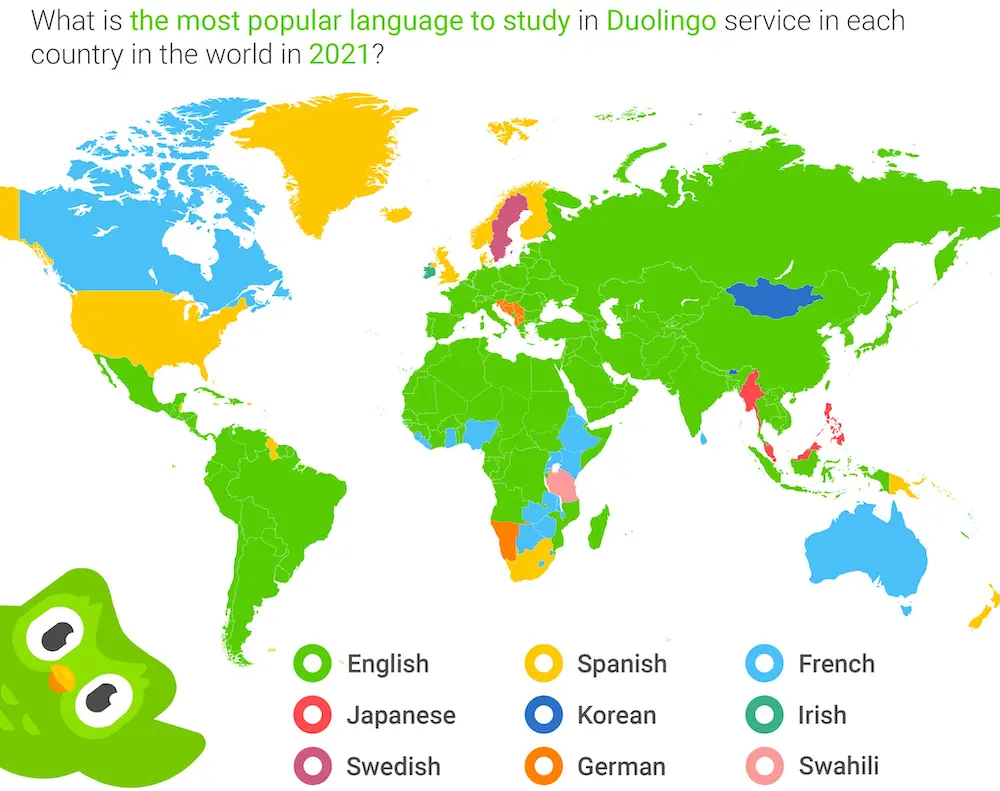Duolingo app is the most popular language learning app as of 2022, with over 500 million downloads, 42 active users, and 12 million Duolingo reviews on Google play store. Founded in USA, the most popular languages among the learners are English (for Spanish speakers) and Spanish (for English speakers).
Also read: 10 reasons to learn a foreign language
If you are serious about learning languages and in here for Duolingo review/feedback, this blog is going to be an eye-opener for language enthusiasts, helping you to make an informed decision. Let’s start with the basics,
What is a language?
Language is the most important social phenomenon in the world. From birth to death, all our activities are regulated by language. Thinking is only possible through language. With the help of language, we can express our thoughts and feelings to others.
The members of the society make use of language for communication purposes. Removing language from its social context empties the communicative aspect of humanity, wherein humans are the only social mammals to whom language provides the communal adhesive.
Duolingo review from social phenomenon standpoint: 1
Oral vs written language
Going back in time about 5000 years ago, the human knowledge and culture was stored and transmitted in the oral form of language for many generations.
About 2000 BC, the written form of a language came into existence in the African and Indian regions.
Learning a language orally is natural, because a language is all about understanding the sounds. The sounds were first denoted by a single letter, then letters combined to form a word, then words into sentences.
That’s the very reason, when people move to a foreign country and start moving around, the repeated hearing of sounds of foreign language, makes them to learn and speak the foreign language in 2 to 3 years. Whereas, when students learn the language through written form, they hardly become fluent.
In this 21st century, the softwares such as Grammarly could write better than the humans. That said, Duolingo is effective for beginners in mastering the alphabets and some basics of a language.
Duolingo review from written language standpoint: 5 / 5
Duolingo review from spoken language standpoint: 2 / 5

Language vs culture
Language is a form of social behavior, a child learns to speak the language of the community in which he or she is placed, he or she picks up the language of the social set-up in he or she grows up.
Language is related to the culture of society: Every language is related to culture of society to which it belongs. The culture of the people naturally influences the language. Every language is the product of society. We cannot separate language from the culture in which that language exists. It has meaning only in relation to that society and culture. (Check out the usage of the word fuck)
The regional variations exist in almost all world including German, Japan, and Korea. For instance, the German language in Germany has something like High German and Low German. (Also read: High German Vs Low German)
The apps like Duolingo focuses on a single variation of the language. In case of German, Duolingo teaches standard German, which is not exactly the same language spoken by the people.
Duolingo review from culture standpoint: 1 / 5
Language and mistakes
Learning of language is not an automatic process. Of course, it is a behavior but it is not type of behavior like walking and crawling that comes to child in natural way. Language by imitation and practice, like how kids learn from their parents. Language is not possible without effort.
Making mistakes in Duolingo app is no match to mistakes made while speaking with real people. To put in another way, the mistakes are an inseparable part of the language learning process. There is a long way between knowing how to speak and speaking.
The body language and expressions & tones play a significant role in conveying your thoughts.
Duolingo review from language learning standpoint: 2 / 5
Duolingo review – Final verdict
The ultimate goal of learning a language is to connect with humans. Like how knowledge is different from application, the written language taught in the schools and mobile apps is different from the spoken language what people speak in the day-to-day life.
A language learning app like Duolingo can be a supplement that can help with the basic words and sentences, or help students looking to score some points in the exams. For serious language learners planning to use language as a tool to enhance/develop their career, then it is NOT recommended to put more than 10% of your efforts into Duolingo.
Conclusion
In conclusion, Duolingo is a useful app for beginners to get started with a new language, especially for learning basic vocabulary and sentence structure. However, for more advanced learners aiming for fluency and cultural understanding, it’s recommended to complement Duolingo with other resources. It excels in written language learning but falls short when it comes to real-world speaking practice.